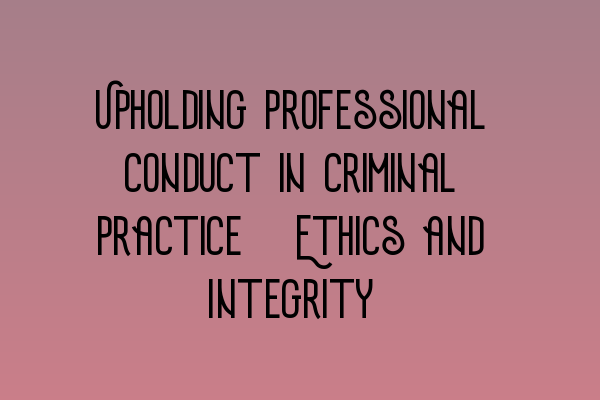Upholding Professional Conduct in Criminal Practice: Ethics and Integrity
Welcome to SQE Criminal Law & Practice Law UK! As solicitors, writers, and SEO experts, we understand the importance of maintaining high ethical standards and upholding professional conduct in the field of criminal practice. In this blog post, we will discuss the fundamental principles of ethics and integrity that should guide every criminal lawyer in their day-to-day practice.
The Role of Ethics in Criminal Practice
Ethics play a crucial role in the legal profession, particularly in criminal practice. Criminal lawyers have a unique responsibility to ensure that justice is served and that their clients’ rights are protected. This responsibility requires a deep commitment to ethical conduct and a steadfast dedication to upholding the principles of fairness, integrity, and honesty.
At SQE Criminal Law & Practice Law UK, we believe that every criminal lawyer should be well-versed in the Code of Conduct for Solicitors. This code provides a comprehensive framework for professional behavior and sets out the ethical obligations that solicitors must adhere to. It covers essential aspects such as client confidentiality, conflicts of interest, and the duty of candor to the court.
By following the Code of Conduct for Solicitors, criminal lawyers can build trust with their clients, colleagues, and the judiciary. Upholding these ethical principles is not only a legal requirement but also a reflection of a lawyer’s commitment to justice and the rule of law.
The Importance of Integrity in Criminal Practice
Integrity is a cornerstone of the legal profession. In criminal practice, maintaining integrity is paramount as it ensures the fairness of the legal process and safeguards the rights of all parties involved.
One of the key aspects of integrity is the duty of disclosure. Criminal lawyers have a duty to disclose all relevant information, whether favorable or unfavorable, to the court. This duty extends to the disclosure of evidence that may weaken their client’s case. Failure to fulfill this duty can have serious consequences, including the potential for miscarriages of justice.
It is crucial for criminal lawyers to act with honesty and transparency in all their dealings, both inside and outside the courtroom. This includes being truthful with clients, opposing counsel, and the court. By maintaining the highest levels of integrity, criminal lawyers can help ensure that justice is served and that the legal system operates in a fair and transparent manner.
Towards a Culture of Professionalism
At SQE Criminal Law & Practice Law UK, we believe in fostering a culture of professionalism within the legal profession. This involves not only adhering to ethical and integrity principles personally but also encouraging and supporting others to do the same.
One way to enhance your knowledge and understanding of professional conduct in criminal practice is by attending workshops and seminars. These events provide invaluable opportunities to learn from experienced professionals, exchange ideas, and gain insights into the latest updates in UK criminal laws. To expand your expertise in criminal practice, be sure to check out our related article on Workshops and Seminars on Criminal Practice: Expanding Your Expertise.
Another vital aspect of upholding professionalism is staying informed about the latest developments in UK criminal laws. By staying up to date, you can better serve your clients and navigate the complexities of the legal system. We recommend reading our article on Updates in UK Criminal Laws: Staying Informed and Prepared for valuable insights and resources.
Enhancing your SQE Criminal Law study group experience is also an excellent way to deepen your understanding of professional conduct. By collaborating with like-minded individuals, discussing ethical dilemmas, and sharing knowledge, you can develop a stronger foundation in ethics and integrity. Check out our article on Enhancing Your SQE Criminal Law Study Group Experience to learn more.
Lastly, a detailed analysis of criminal evidence rules is essential for any criminal lawyer. Understanding the nuances and requirements of presenting evidence in court is crucial to maintaining professionalism and ethical practice. To gain a comprehensive understanding of criminal evidence rules, we highly recommend reading our article on Decoding Criminal Evidence Rules: A Detailed Analysis.
By integrating these resources and fostering a culture of professionalism, we can collectively raise the standards of ethical conduct in criminal practice. Together, let’s strive for justice, integrity, and fair representation.
Thank you for reading this blog post on upholding professional conduct in criminal practice. For further insights into fraud and financial crimes in the UK, feel free to explore our article on Deep Dive into Fraud and Financial Crimes in the UK.
Stay tuned for more informative and engaging content from SQE Criminal Law & Practice Law UK!
